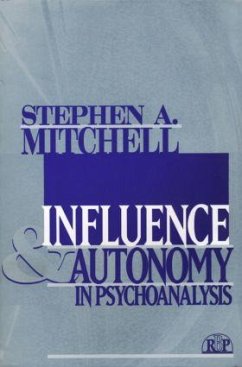
Psychoanalysis
The Science of Mental Conflict
Herausgeber: Richards, Arnold D.; Willick, Martin S.
Versandkostenfrei!
Versandfertig in 1-2 Wochen
52,99 €
inkl. MwSt.

PAYBACK Punkte
26 °P sammeln!
Over the course of three decades, in works spanning questions of theory, technique, and clinical practice, Charles Brenner has emerged as one of the preeminent analysts of his generation, a thinker whose probing estimation of mental conflict has promoted the evolutionary growth of analysis as theory even as it has clarified the clinical import of analysis as therapy. In Psychoanalysis: The Science of Mental Conflict, distinguished theorists and clinicians pay homage to Brenner by presenting original essays that converge in their estimation of analysis as "the science of mental conflict." In se...
Over the course of three decades, in works spanning questions of theory, technique, and clinical practice, Charles Brenner has emerged as one of the preeminent analysts of his generation, a thinker whose probing estimation of mental conflict has promoted the evolutionary growth of analysis as theory even as it has clarified the clinical import of analysis as therapy. In Psychoanalysis: The Science of Mental Conflict, distinguished theorists and clinicians pay homage to Brenner by presenting original essays that converge in their estimation of analysis as "the science of mental conflict." In sections that encompass "The Theory of Psychoanalysis," "The Concepts of Psychoanalysis," "The Technique of Psychoanalysis," "The Clinical Practice of Psychoanalysis," "The Teaching of Psychoanalysis," and "The Application of Psychanalysis," the contributors show how the perspective of conflict - broadened and refined by the clinical findings of recent decades - offers a vehicle for creative theory-building and, as such, a conceptual handle for apprising the indications for, and action of, psychoanalytic therapy. Arnold Richards' comprehensive overview of Brenner's ranging contributions to theory and practice, along with Martin Willick's critical introductions to the various sections of the book, round out a collections whose scope is complimented by its unusual coherence and thematic unity. Taken together, the essays comprising this book present readers with a cogent summary of current psychoanalytic thinking, along with an exciting preview of where it is heading in the future. As such, this volume will be welcomed not only by analysts, but by all mental health professionals who draw on, and learn from, the psychoanalytic assessment of conflict in mental life. It is a work that follows Brenner's own example in promoting the critical understanding of a generation of theorists, clinicians, and educators.














